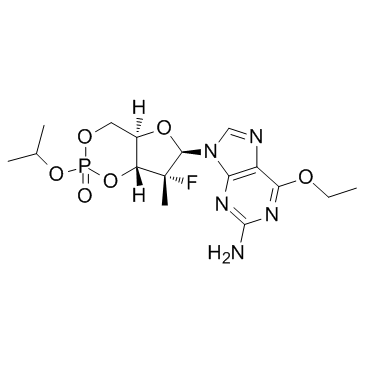| Description |
PSI-352938 is a hepatitis C virus (HCV) nucleotide inhibitor.
|
| Related Catalog |
|
| Target |
HCV
|
| In Vitro |
PSI-352938 and PSI-353661 inhibit HCV genotype (GT) 1b replicon replication with 50% effective concentrations (EC50s) of 0.13±0.076 μM and 3.0±1.4 nM, respectively, and are similarly active against GT 1a and 2a replicons and infectious viruses. Metabolism of PSI-352938 and PSI-353661 generates the same 5′-triphosphate metabolite, PSI-352666, which is similarly active against NS5B polymerases from GT 1 to 4[1]. PSI-352938 is a novel cyclic phosphate prodrug of β-D-2′-deoxy-2′-α-fluoro-2′-β-C-methylguanosine 5′-monophosphate that has potent activity against HCV. PSI-352938 has similar activity against genotype 1a, 1b, and 2a replicons, with EC50s ranging from 0.13 to 0.20 μM and EC90 values ranging from 0.35 to 0.74 μM. PSI-352938 also effectively inhibits HCV replication in the infectious virus assays: the EC50 and EC90 values are 0.28±0.083 μM and 0.63±0.018 μM, respectively, against the H77 infectious virus and 0.39±0.31 μM and 1.16±0.64 μM, respectively, against the JFH-1 infectious virus. In contrast, PSI-352938 is not active against HBV or HIV up to the highest concentration tested (EC50>100 μM)[2].
|
| Cell Assay |
GT 1a, 1b, and 2a replicon cells are cultured in the presence of G418 (0.75 mg/mL for GT 1a, 0.25 mg/mL for GT 1b and 2a) and increasing concentrations of PSI-352938 or PSI-353661 starting at their respective EC50 or EC90. As a no-compound control, replicon cells are maintained in parallel in the equivalent percent volume (0.2%) of DMSO. Cells are passaged whenever they reach ∼80% confluence and replenished with G418 medium containing fresh compound. At various passages, cells are tested for sensitivity to PSI-352938 and PSI-353661. For each assay, 3-fold dilutions of test compound are added to cells in duplicate and incubated at 37°C in a humidified 5% CO2 atmosphere for 4 days. Inhibition of HCV replicon RNA replication is determined by real-time PCR (RT-PCR) using primers that anneal to the 5′ untranslated region or by measuring the levels of luminescence expressed via the firefly or Renilla luciferase reporter gene using the Bright-Glo or Renilla-Glo reagent, respectively. EC50 and EC90, the concentrations at which 50% and 90% inhibition are achieved, are determined using GraphPad Prism software. Aliquots of cells are also saved for RNA isolation, cDNA synthesis, and PCR amplification for sequencing analysis[1].
|
| References |
[1]. Lam AM, et al. Hepatitis C virus nucleotide inhibitors PSI-352938 and PSI-353661 exhibit a novel mechanism of resistance requiring multiple mutations within replicon RNA. J Virol. 2011 Dec;85(23):12334-42. [2]. Lam AM, et al. Inhibition of hepatitis C virus replicon RNA synthesis by PSI-352938, a cyclic phosphate prodrug of β-D-2'-deoxy-2'-α-fluoro-2'-β-C-methylguanosine. Antimicrob Agents Chemother. 2011 Jun;55(6):2566-75.
|
